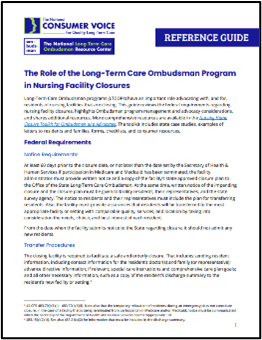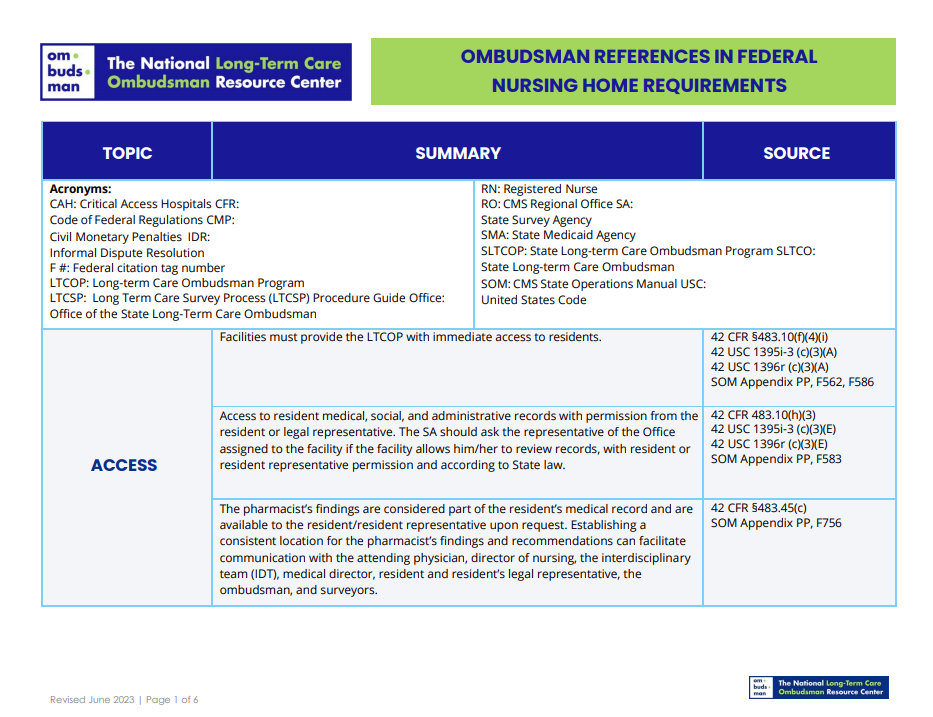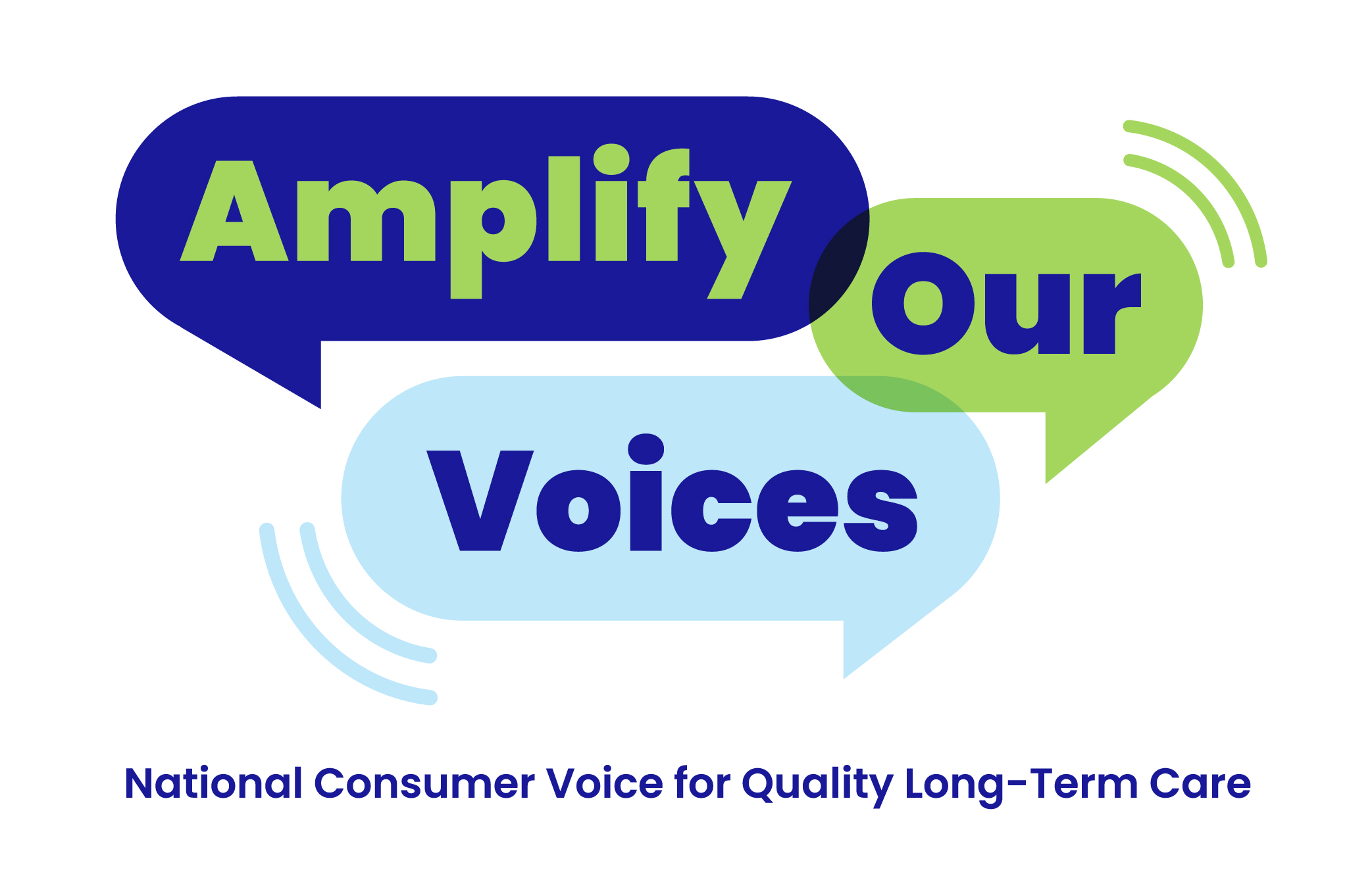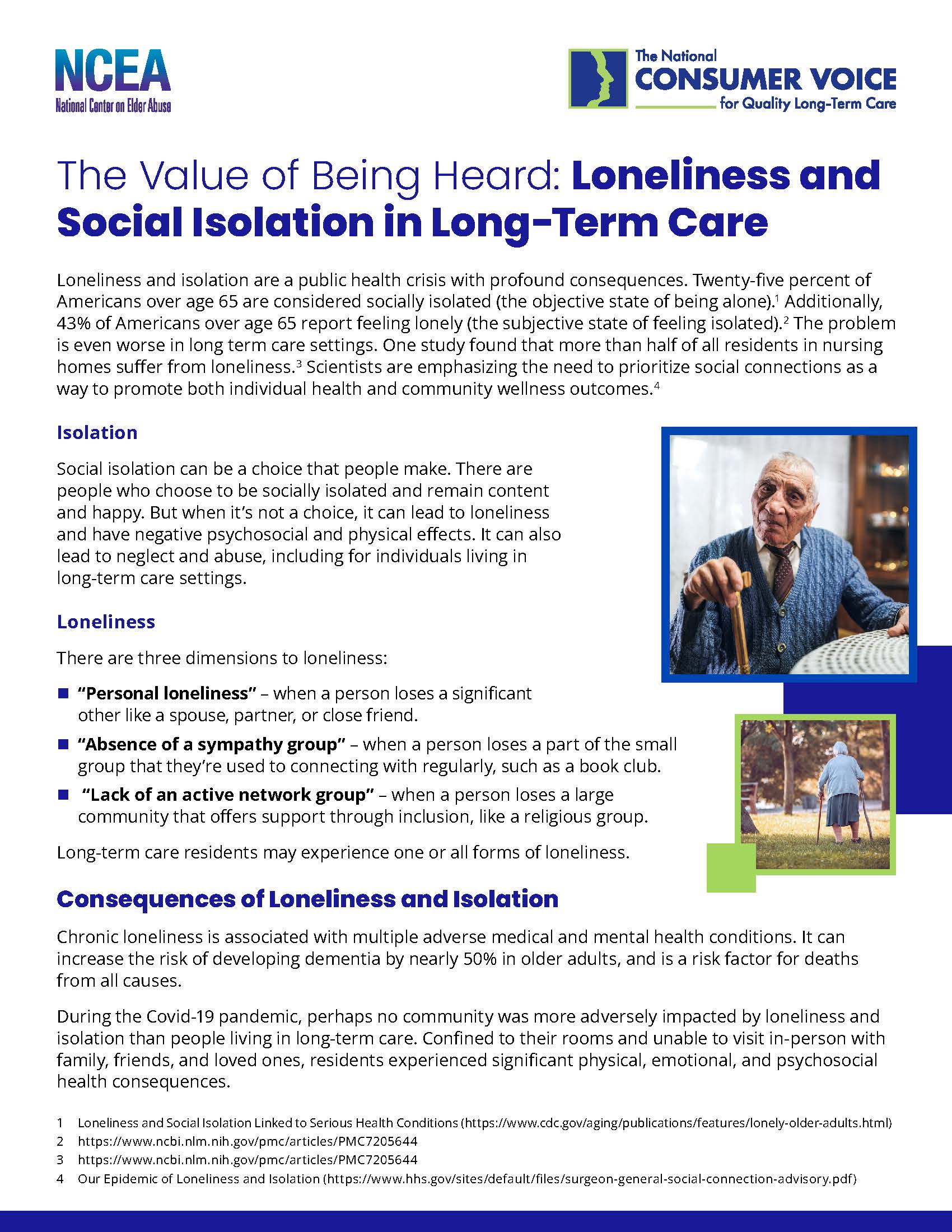June 2023 | Volume 9, Issue 4
|
|
In this issue:
|
|
Federal Updates
The Administration for Community Living (ACL) is seeking input on proposed updates to the regulations for its Older Americans Act (OAA) programs. The last substantial update to most OAA program regulations was in 1988; the OAA has been amended by Congress seven times since 1988.
ACL states that the proposed rule addresses issues that have emerged since the last update and clarifies several requirements. It aims to better support the national aging network that delivers OAA services and improve program implementation, with the ultimate goal of better serving older adults. This Notice of Proposed Rulemaking (NPRM) looks at all OAA programs including the Long-Term Care Ombudsman Program, Elder Abuse Prevention, Legal Services, and Family Caregivers. Refer to the overview document for more information.
ACL solicited input from the field as it developed these proposed rules through a Request for Information (RFI) and series of listening sessions. Consumer Voice submitted comments on the RFI last year and hosted a listening session on the topic at a past annual meeting.
Instructions for submitting comments can be found in the NPRM. Comments must be received by 11:59 pm ET on August 15, 2023. For more information on the proposed rule, visit the ACL website.
|
|
Update Regarding NORC Communication and Technical Assistance
This issue marks the final publication of the Ombudsman Outlook e-newsletter. Over the past nine years, the Ombudsman Outlook has provided quarterly updates for Ombudsman programs including resources, tips, and news about Ombudsman programs and practices. As the National LTC Ombudsman Resource Center (NORC) moves toward shorter forms of content, we have decided to no longer publish the Ombudsman Outlook. Instead, we have created several additional forums for sharing information going forward including posting weekly Technical Assistance Tips on social media, hosting quarterly Technical Assistance Talks, and holding monthly Virtual Office Hours. Select "learn more" below for a brief overview of each of these new forms of communication from NORC. If you have questions, an idea for a future topic, or examples of training, consumer education, or successful advocacy, email NORC at ombudcenter@theconsumervoice.org.
Learn more »
|
|
New and Updated Resources
NEW! Technical Assistance (TA) Talk Materials on Loneliness and Social Isolation in Long-Term Care
To increase direct access to technical assistance (TA) and peer support, NORC hosts quarterly live technical assistance dialogues. The June TA Talk discussed Loneliness and Social Isolation in Long-Term Care. Severe seclusion during the COVID-19 pandemic led to many emotional, physical, and psychosocial health consequences. However, many residents experienced loneliness and social isolation and the related mental and physical consequences before and after the pandemic, view the recording and materials here. Mark your calendar for the next TA Talk on September 20, 2023, and Let’s Talk About the National Ombudsman Reporting System (NORS)! Have questions, an idea for a future topic, or examples of training, consumer education, or successful advocacy? Email NORC at ombudcenter@theconsumervoice.org.
NEW! Weekly Technical Assistance (TA) Tips on Social Media
Do you have a question you want answered by NORC? On Tuesdays, the National Long-Term Care Ombudsman Resource Center (NORC) shares weekly Technical Assistance (TA) Tips on social media. The tips are shared on NORC's Facebook and Twitter pages. The purpose of the TA Tips is to provide quick and engaging information on social media for the Long-Term Care Ombudsman program (LTCOP) network. The TA Tips highlight new NORC resources; remind you of existing NORC resources; share LTCOP best practices; provide information about the LTCOP; and respond to FAQs. If you are not on Facebook or Twitter, catch up on each month's TA Tips in the monthly email to our network. Read the May and April 2023 TA Tips.
NEW! Webinar Recording and Materials Available on the Role of the Ombudsman Program in Nursing Facility Closures
Each year, many nursing facilities across the country close their doors. Closures disrupt the lives of the residents living there and too often become chaotic in a variety of ways. The Long-Term Care Ombudsman program (LTCOP) can assist with ensuring that residents receive appropriate notice and that their rights are protected during the closure process. Lori Smetanka, Executive Director, Consumer Voice, and Carol Scott, Manager, LTCOP Program & Policy, reviewed the role of the LTCOP, highlighted the federal requirements facilities and the state survey agencies must follow, and introduced a new resource. Participants also heard from LTCOP representatives from Kentucky and Iowa.
NEW! Reference Guide on the Role of the Long-Term Care Ombudsman Program in Nursing Facility Closures
 Long-Term Care Ombudsman programs (LTCOPs) have an important role advocating with, and for, residents of nursing facilities that are closing. This guide reviews the federal requirements regarding nursing facility closures, highlights Ombudsman program management and advocacy considerations, and shares additional resources. Long-Term Care Ombudsman programs (LTCOPs) have an important role advocating with, and for, residents of nursing facilities that are closing. This guide reviews the federal requirements regarding nursing facility closures, highlights Ombudsman program management and advocacy considerations, and shares additional resources.
NEW! Virtual Office Hour Resources
NORC hosts a virtual office hour the last Wednesday of each month at 2:00 pm ET. This is an opportunity to ask questions, share information, and have open conversations with your peers and NORC staff. These Zoom calls do not include a structured presentation and are open to all State Ombudsmen and their program representatives. Although these calls are not recorded and there is no formal presentation, a list of resources mentioned in each call is available on the NORC website. If your program has a resource related to the topic, please email ombudcenter@theconsumervoice.org.
UPDATED! Ombudsman Reference in Federal Nursing Home Requirements
 The NORC resource, Ombudsman References in Federal Nursing Home Requirements, has been updated to include information about transfer/discharge notices in Critical Access Hospitals (CAHs) and Swing Beds. The NORC resource, Ombudsman References in Federal Nursing Home Requirements, has been updated to include information about transfer/discharge notices in Critical Access Hospitals (CAHs) and Swing Beds.
|
|
TA Hot Topic: Disclosure of Ombudsman Records
Question: After working with a resident on a complaint, the resident asked me for a copy of my case records stating since the complaint was about his care, they are his records. Do my case records belong to the resident?
Answer: The records maintained by the Long-Term Care Ombudsman program (LTCOP) are the property of the program. They do not belong to the resident or the complainant. Each state should have policies and procedures outlining their process for providing copies of records to anyone requesting them, including the resident or their representative. The Final LTCOP Rule states:
Policies and procedures regarding disclosure of files, records and other information maintained by the Ombudsman program must include, but not be limited to: (i) Provision that the files, records, and information maintained by the Ombudsman program may be disclosed only at the discretion of the Ombudsman or designee of the Ombudsman for such purpose and in accordance with the criteria developed by the Ombudsman, as required by § 1324.13(e);
For an overview of the issue of disclosure of records, look at this resource: Disclosure of Files, Records, and Other Information Maintained by the LTCOP.
|
|
National Ombudsman Reporting System (NORS) Corner
Question: My state requires entities to send copies of alleged abuse or incident reports to my program. Upon receipt, do I automatically document those reports as complaints?
Answer: No. Receiving a copy of alleged abuse or incident report does not automatically count as a complaint. Examples include, but are not limited to, a state requiring long-term care facilities to send copies of incident reports to the Ombudsman program and/or a state requiring Adult Protective Services (APS) to send copies of their reports or referrals to the Ombudsman program.
In these examples, the facilities and/or APS are complying with a state requirement to send copies of these reports to your program. They are not acting as a complainant and reporting a complaint on behalf of a resident seeking Ombudsman program assistance, rather they are sharing information with your program per state requirements.
For more information and to read the full FAQ, review our NORS FAQs.
Do you have a question about NORS? Email us at ombudcenter@theconsumervoice.org.
Learn more »
|
|
News from the Network
Texas Ombudsman Program Representative, Alexa Schoeman, Interviewed on the $15 Personal Needs Allowance Increase in Texas
Ohio Ombudsman Program Representative, Linda Kerdolff, Interviewed on Facility Closures
Colorado State Ombudsman, Leah McMahon, Testifies in a Senate Hearing on Nursing Home Inspections and Transparency
Maine State Long-Term Care Ombudsman, Brenda Gallant, on Quality of Care in Residential Care Facilities
Ohio State Ombudsman, Jackie DeGenova, is Interviewed on the State’s Budget for Nursing Homes
District of Columbia State Ombudsman, Mark Miller, is Interviewed on a Blog Show Discussing Improving Quality of Care for Nursing Home Residents
Massachusetts Ombudsman Program Mentioned in Article on Nursing Home Closures
Connecticut State Ombudsman, Mairead Painter, Interviewed on Several Long-Term Care Issues
|
|
Volunteers Recruiting Volunteers – A Challenge!
I had a conversation with a friend recently about the joys of retirement. He said the number one joy is that his schedule is wide open, and he stays away from daily or weekly commitments. My immediate reaction was GREAT! He could become a volunteer Ombudsman representative! While there are a lot of volunteer opportunities in each community, most opportunities don’t allow people to determine when they want to do the work.
This led me to think of other advantages of volunteering for the Long-Term Care Ombudsman program (LTCOP). If someone is a “people person” this is a match. The opportunity to visit with elders and people with disabilities is a core responsibility. Whether it is one-on-one or in a group setting, having conversations is key to building a relationship of trust. For people who like to share information and educate others, what better topic than residents’ rights! Problem-solvers will love volunteering as an Ombudsman representative. Empowering residents to improve their daily lives or taking an issue on their behalf to someone who can make a change in the resident’s life is very satisfying.
Do you recognize yourself or others in the above examples? If so, you are encouraged to reach out to others and invite them to learn more about the LTCOP. In fact, we challenge all volunteers to recruit at least one person! This person doesn’t have to be retired and doesn’t have to live in the same town. Take on the challenge and think broadly!
Learn more »
|
|
Quick Tips: National Paralysis Resource Center
The mission of the National Paralysis Resource Center (NPRC) operated by the Christopher & Dana Reeve Foundation, and funded by the Administration for Community Living (ACL), is to improve the quality of life for people living with paralysis through grants, information, and advocacy. The NPRC assists people as they navigate through the various stages of their recovery after the diagnosis of paralysis.
Information Specialists are trained staff who help anyone — from newly paralyzed individuals and their family members to persons who have lived with paralysis and mobility impairments long-term. All the NPRC’s educational materials are available at no cost. For more information on this resource center, check out the National Paralysis Resource Center website.
There is additional information for Ombudsman programs on the NORC website. NORC will host a webinar in September with representatives from the NPRC. Stay tuned for webinar details and registration.
|
|
Residents' Rights Month 2023 - Amplify Our Voices
 October is Residents’ Rights Month, an annual event to honor residents living in long-term care facilities. It is an opportunity to focus on and celebrate the dignity and rights of every individual receiving long-term care services and supports. This year’s Residents’ Rights Month theme - Amplify Our Voices - emphasizes a community of long-term care residents coming together to make their voices heard. Amplifying your voice means being outspoken about sharing your preferences and choices and sharing who you are and your experiences. As you prepare for Residents' Rights Month in October, visit Consumer Voice’s Residents' Rights Month webpage for more information and materials. This page will continue to be updated. October is Residents’ Rights Month, an annual event to honor residents living in long-term care facilities. It is an opportunity to focus on and celebrate the dignity and rights of every individual receiving long-term care services and supports. This year’s Residents’ Rights Month theme - Amplify Our Voices - emphasizes a community of long-term care residents coming together to make their voices heard. Amplifying your voice means being outspoken about sharing your preferences and choices and sharing who you are and your experiences. As you prepare for Residents' Rights Month in October, visit Consumer Voice’s Residents' Rights Month webpage for more information and materials. This page will continue to be updated.
Residents are Invited to Participate in the 2023 Resident’s Voice Challenge
The Resident’s Voice Challenge encourages residents to submit essays, poems, artwork, drawings, or videos related to the Residents’ Rights Month theme, Amplify Our Voices. As part of the Resident’s Voice Challenge, residents are encouraged to create a video sharing who you are and how you amplify your voice by answering the questions: What does it mean to be heard and how do you make yourself heard? Alternatively, residents can respond to the Resident’s Voice Challenge in writing (essays, poems, word collages), artwork (posters, paintings, drawings), audio (songs or spoken word), or photos. Visit the Consumer Voice website for more information on how to participate. Submissions are due September 1, 2023.
|
|
Events

September 20,2023: Quarterly Technical Assistance (TA) Talk – Let’s Talk About the National Ombudsman Reporting System (NORS) | 3:00 - 4:00 pm ET
October 2023: Residents' Rights Month – Learn more »
October 31 – November 1, 2023: Consumer Voice Annual Conference – Learn more »
Last Wednesday of Each Month: Virtual Office Hour. Upcoming Topics: July – Enhancing Access to LTCOP Services for residential care community (RCC) residents; August – Systems Advocacy 101; September – Maintaining Boundaries. Learn more »
|
|
Featured Consumer Voice Resource
Fact Sheet - The Value of Being Heard: Loneliness and Social Isolation in Long-Term Care
Loneliness and isolation are a public health crisis with profound consequences. Twenty-five percent of Americans over age 65 are considered socially isolated (the objective state of being alone). Additionally, 43% of Americans over age 65 report feeling lonely (the subjective state of feeling isolated). The problem is even worse in long-term care settings. One study found that more than half of all residents in nursing homes suffer from loneliness. Scientists are emphasizing the need to prioritize social connections to promote both individual health and community wellness outcomes. The new fact sheet, The Value of Being Heard: Loneliness and Social Isolation in Long-Term Care, published by Consumer Voice and the National Center on Elder Abuse (NCEA), highlights the consequences of loneliness and isolation, and provides resources for families, friends, and staff to strengthen social connections and community integration.

|
|
Read past issues of the Ombudsman Outlook on the NORC website. If you did not receive this email directly and would like to sign-up to receive NORC emails please fill out the form on our website. If you would like to receive The Voice (the Consumer Voice weekly e-newsletter) sign-up on the Consumer Voice website. If you have any questions, challenges, or article suggestions related to long-term care Ombudsman advocacy and program management, please let us know.
|

|
